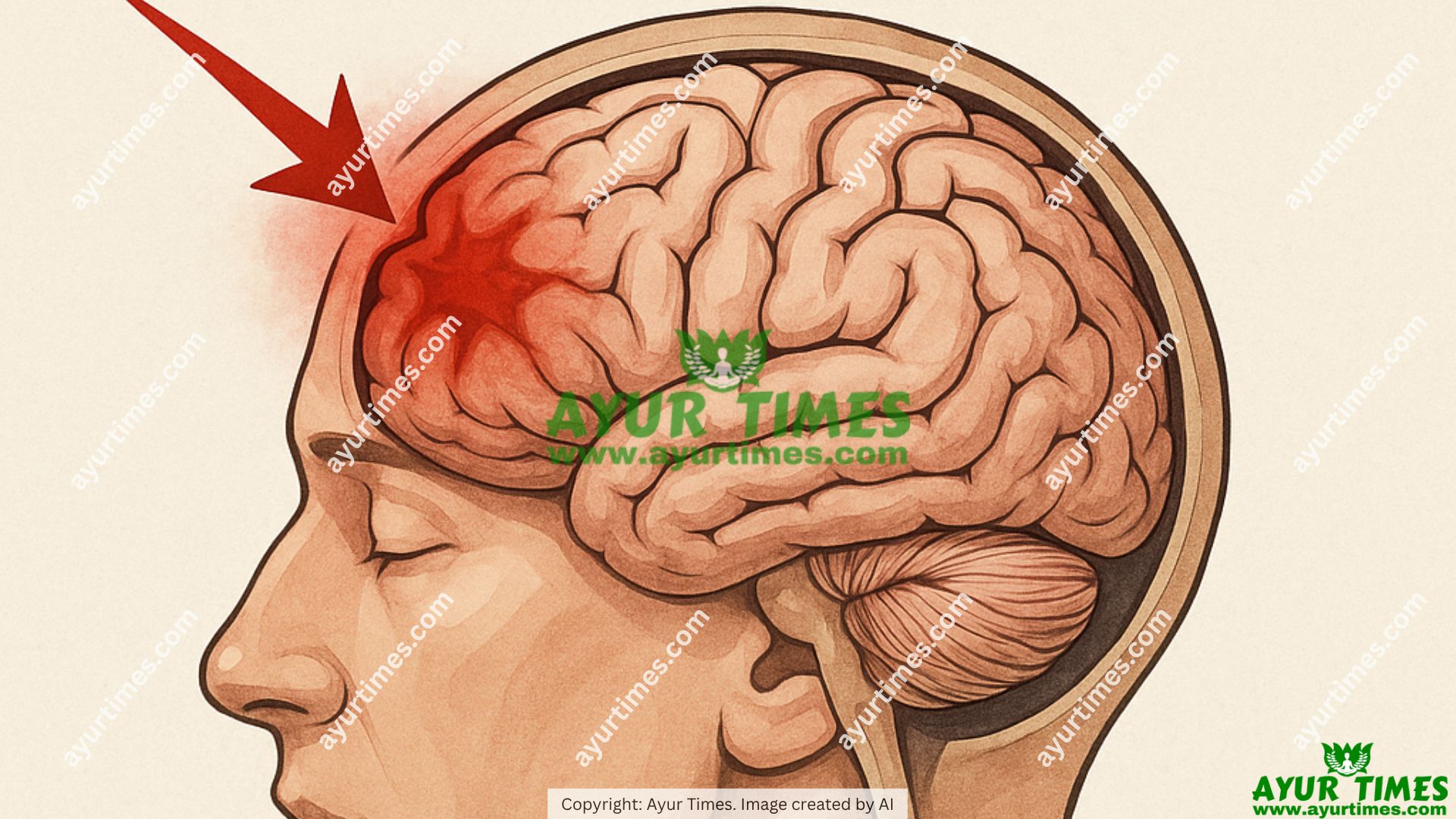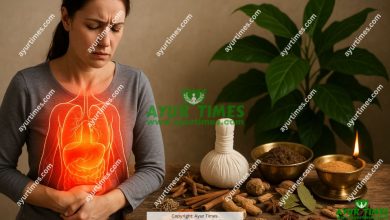Ayurvedic Treatment
Ayurvedic Treatment for Traumatic Brain Injury (TBI) – Herbs, Protocol & Dosha Analysis

Traumatic Brain Injury (TBI) occurs when an external force injures the brain, often due to accidents, falls, or violent impacts. TBI can range from mild (concussions) to severe forms involving loss of consciousness, cognitive deficits, motor dysfunction, speech problems, and emotional changes. In Ayurveda, such injuries are considered a result of sudden trauma (Abhighata) leading to disturbance in Vata dosha and damage to Majja Dhatu (nervous tissue).
Ayurvedic Dosha Analysis & Treatment Principle
Dosha Involvement:
- Vata is the primary dosha aggravated in TBI due to sudden movement and impact.
- Pitta may become involved in cases of inflammation, fever, or agitation.
- Kapha may dominate in comatose states, lethargy, or heaviness in the head.
Affected Dhatus:
- Majja Dhatu (Nervous tissue)
- Shukra Dhatu (long-term regeneration and neurohormonal axis)
- Ojas (vitality and immunity) may also get depleted.
Treatment Principles:
- Vata Shamana (Pacifying Vata)
- Majja Dhatu Poshana (Nourishing the nervous tissue)
- Rasayana Chikitsa (Rejuvenation and neuro-restorative therapy)
- Srotoshodhana (Cleansing neural channels)
Ayurvedic Treatment Protocol
| Phase | Aim | Therapy/Approach |
|---|---|---|
| Acute Phase | Stabilise Vata, reduce inflammation | Basti, Nasya, anti-Vata herbs |
| Subacute Phase | Promote healing, tissue regeneration | Rasayana herbs, Medhya Rasayana |
| Chronic Phase | Restore memory, cognition, strength | Panchakarma (as needed), Ghrita, Tonics |
Treating Root Cause
Ayurveda views trauma as an external cause that disturbs the internal balance of Vata dosha. Hence, the root treatment lies in:
- Normalising Vata
- Repairing neural tissue (Majja Dhatu)
- Restoring Ojas and brain function with Rasayana therapy
Ayurvedic Treatment & Medicines
| Medicine Name | Key Action |
|---|---|
| Brahmi Ghrita | Neuroregeneration, memory, intelligence booster |
| Kalyanaka Ghrita | Cognitive enhancement, mood stabiliser |
| Ashwagandha Churna | Vata balancing, nerve tonic, anti-inflammatory |
| Shankhpushpi Syrup | Calming, improves mental clarity |
| Saraswatarishta | Nervine tonic, speech and memory enhancer |
| Panchagavya Ghrita | Detox, improves intellect and coordination |
| Mahakalyanaka Ghrita | Deep neuro-rasayana for long-term recovery |
| Medhya Rasayana (combo) | Overall brain and mind nourishment |
| Dashamoola Kwath | Anti-inflammatory, Vata-pacifying |
| Bala Taila (Abhyanga) | Strengthens nervous pathways, reduces spasm |
| Shirodhara (with Brahmi oil) | Mental calm, restores nervous equilibrium |
Explanation of Medicines
1. Brahmi Ghrita
- How it Works: Enriched with Brahmi and other Medhya herbs, it deeply nourishes the brain tissues, enhances synaptic functions, and supports regeneration.
- Suitable Dosha: Vata-Pitta
- Recommended Symptoms: Memory loss, cognitive decline, disorientation
- Avoid In: Severe Kapha states with heaviness or thick secretions
2. Kalyanaka Ghrita
- How it Works: Acts on higher cortical functions; promotes mental wellness and neuroplasticity.
- Suitable Dosha: Vata and Pitta
- Recommended Symptoms: Anxiety, depression, speech delay, mental fog
- Avoid In: Ama conditions; combine with Deepana-Pachana if digestion is weak
3. Ashwagandha Churna
- How it Works: Potent adaptogen and Rasayana; strengthens neural tissues, reduces stress response.
- Suitable Dosha: Vata-Kapha
- Recommended Symptoms: Weakness, fatigue, tremors, loss of coordination
- Avoid In: High Pitta states with bleeding or heat signs
4. Shankhpushpi Syrup
- How it Works: Mild calming effect; increases attention span, clarity, and reduces overexcitation.
- Suitable Dosha: Pitta-Vata
- Recommended Symptoms: Agitation, sleep disturbances, restlessness
- Avoid In: Kapha-prone patients with sluggish metabolism
5. Saraswatarishta
- How it Works: Fermented tonic with Medhya and nervine herbs; rejuvenates cognitive pathways and vocal abilities.
- Suitable Dosha: Tridoshic, best for Vata-Pitta
- Recommended Symptoms: Poor speech, stammering, irritability, poor comprehension
- Avoid In: Alcohol-sensitive patients
6. Panchagavya Ghrita
- How it Works: Combines cow-derived ingredients that detoxify and awaken higher mental faculties.
- Suitable Dosha: Vata and Kapha
- Recommended Symptoms: Poor coordination, dullness, mental lethargy
- Avoid In: Digestive weakness or sensitivity to dairy
7. Mahakalyanaka Ghrita
- How it Works: Very potent Rasayana; acts on both physical and subtle brain levels including speech, memory, and awareness.
- Suitable Dosha: Vata-Pitta
- Recommended Symptoms: Delayed milestones, post-traumatic amnesia, irritability
- Avoid In: Ama and Mandagni; use only after digestive fire is normal
8. Medhya Rasayana (Mandukaparni, Yashtimadhu, Guduchi)
- How it Works: These herbs work synergistically to restore higher brain functions and enhance neuroprotection.
- Suitable Dosha: Tridoshic
- Recommended Symptoms: Long-term recovery, improving brain plasticity
- Avoid In: Very Kapha-dominant states with excess mucus
9. Dashamoola Kwath
- How it Works: Strongly pacifies Vata and supports musculoskeletal and neural recovery after trauma.
- Suitable Dosha: Vata
- Recommended Symptoms: Pain, stiffness, spasticity, muscular weakness
- Avoid In: Severe dehydration or Pitta-aggravated conditions
10. Bala Taila (for Abhyanga)
- How it Works: Improves neuro-muscular strength, relieves rigidity and tremors.
- Suitable Dosha: Vata
- Recommended Symptoms: Loss of coordination, tremor, limb weakness
- Avoid In: Acute inflammation or fever
11. Shirodhara (with Brahmi or Ksheerabala Taila)
- How it Works: Soothes the mind, resets autonomic balance, improves neuroendocrine recovery.
- Suitable Dosha: Vata-Pitta
- Recommended Symptoms: Sleep issues, emotional instability, memory fog
- Avoid In: Head cold or Kapha-dominant sinusitis
Points to be Remembered
- Panchakarma is useful only after stabilisation and under proper supervision.
- Ghrita-based Rasayana should only be used when digestive fire (Agni) is sufficient.
- Avoid heavy or drying therapies in early phases unless guided by Vaidya.
- Regular use of Nasya, Abhyanga, and medhya herbs ensures long-term recovery.
- Proper diet: Warm, nourishing, Vata-pacifying foods are ideal.


